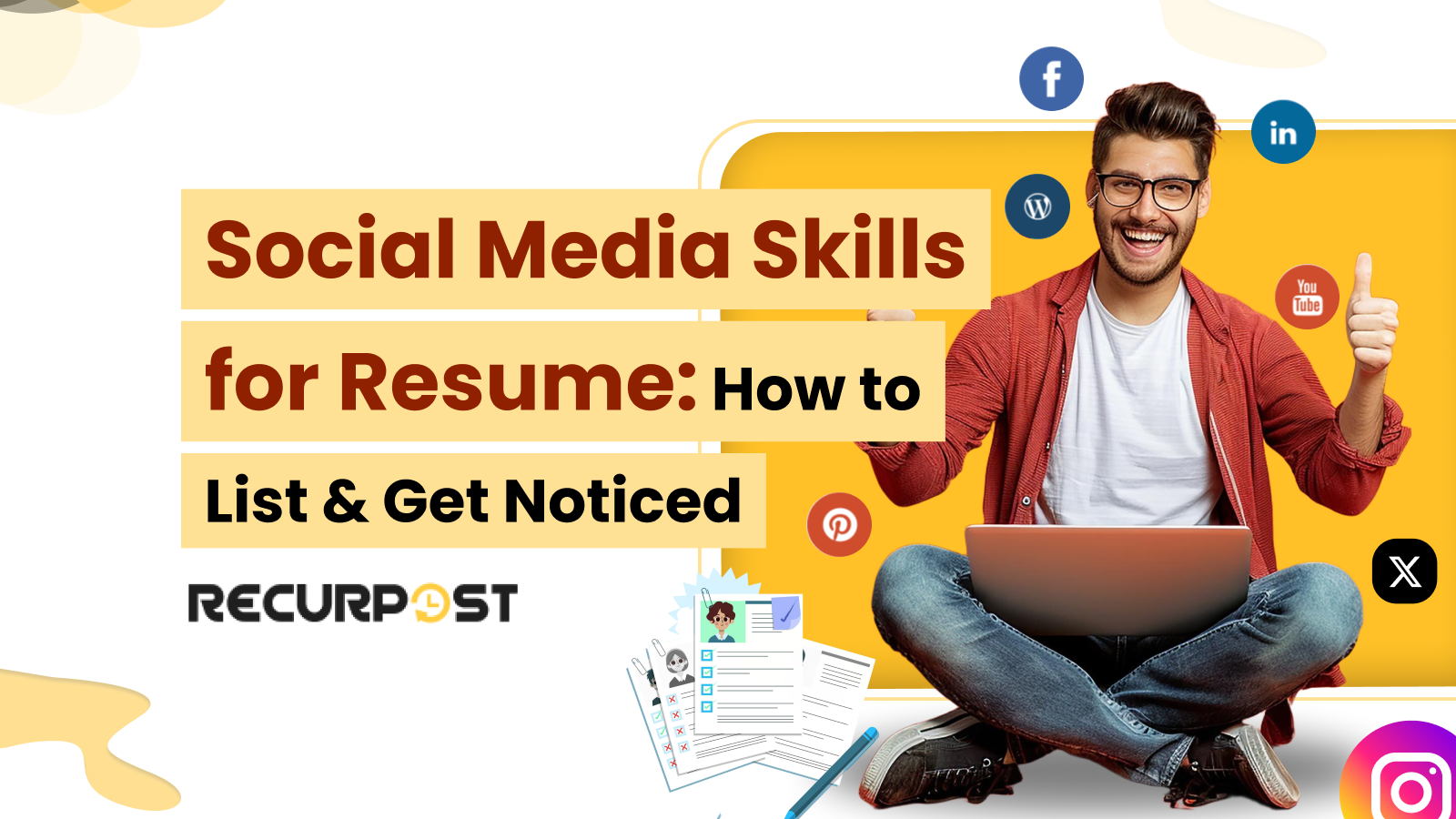“I Have Social Media Skills, But My Resume Isn’t Getting Me the Job”
It is because you don’t know how to list social media marketing skills on a resume!
You know how to build brands using social media. You create compelling content, grow accounts, optimize paid campaigns, and analyze engagement data to improve performance. Yet, despite these social media skills for a resume, your resume isn’t standing out.
Simply listing social media skills for resume isn’t enough; a compelling social media skills resume needs to demonstrate measurable impact. Employers and recruiters want quantifiable proof of your results. Hiring managers scan for:
- Proven audience growth and maximized engagement metrics
- Mastery of analytics tools and data-driven decision-making
- Experience running paid ad campaigns with quantifiable ROI
- An ability to adapt to platform algorithm changes and emerging trends
If your resume isn’t leading to interviews, it’s time to change how you present your social media marketing skills on resume. Below is a step-by-step breakdown of how to optimize your resume and ensure your social media marketing expertise shines, complete with resume examples and CV examples that demonstrate effective presentation.
You might also want to check out: Interview Questions for a Social Media Manager: Interview Questions for a Social Media Manager
Choosing the Right Resume Format for Social Media Jobs

Before discussing social media skills for resume, let’s establish the right structure. Your resume format can make or break your chances of getting hired. Employers scan resumes quickly, so the structure must highlight your social media marketing skills, experience, and achievements clearly. The right format ensures your social media skills resume passes ATS (Applicant Tracking System) screening and remains readable.
Best Resume Formats for Social Media Jobs
| Resume Format | Best For | Why It Works | Potential Downsides |
| Chronological | Social Media Managers, Digital Marketers with steady career growth | Showcases work history, achievements, and career progression | Not ideal if you have gaps or are switching careers |
| Functional | Freelancers, career changers, diverse experience | Highlights skills and key projects instead of job history | Some recruiters prefer seeing a clear work timeline |
| Combination | A mix of freelance and full-time experience | Balances skills, achievements, and work history | Requires strong organization to avoid repetition |
Which Resume Format Works Best?
Not all resumes are created equal. The format you choose should highlight your social media skills for resume, achievements, and experience in a way that grabs attention and passes ATS (Applicant Tracking System) scans. Here’s how each format stacks up in depth:
1. Chronological Resume: Best for Social Media Pros with Strong Experience
A chronological resume is the standard format for a social media manager resume, listing jobs in reverse order (most recent first). It works best if you’ve had a clear career path in social media marketing and want to emphasize measurable success.
Best for:
- Social Media Managers with years of experience
- Digital Marketing Specialists with consistent career growth
- Candidates applying for senior roles
If your resume tells a strong career story, this format works.
2. Functional Resume: Best for Career Changers & Freelancers
A functional resume focuses on skills and accomplishments rather than work history. If you’re switching careers, have freelance experience, or have gaps in your resume, this lets you highlight what you bring to the table without focusing on job titles.
Best for:
- Freelance social media consultant juggling multiple projects
- Career changers moving into social media
- Applicants with gaps in traditional work experience
If you have great results but not a traditional job path, this format makes sure your skills and impact shine. You can also check out freelance social media jobs here.
3. Combination Resume: Best for a Mix of Freelance & Full-Time Experience
A combination (hybrid) resume blends social media skills for resume and work experience, making it great if you have both freelance and traditional roles. It highlights what you know and where you’ve applied it.
Best for:
- Candidates applying for a variety of social media jobs
- Professionals with both freelance and corporate experience in social media marketing
- Job seekers who want social media skills for resume and expertise to be equally emphasized
If you’re entry-level to the industry, a functional or hybrid format works best. If you have strong experience, go with a chronological resume to emphasize career growth.
How to Write a Powerful Summary for Your Social Media Resume
Understanding which social media skills for resume are most valuable in your industry matters because your resume summary has just seconds to make an impact. A well-crafted summary immediately positions you as the right candidate for the job.
A strong social media resume summary should:
- Be concise: 2 to 4 sentences maximum.
- Highlight expertise: Focus on key social media marketing skills and relevant experience.
- Use numbers: Show measurable success in audience growth, engagement, or conversions.
- Match the job description: Include relevant industry keywords to pass ATS screening.
Examples of Strong Social Media Resume Summaries
| Job Level | Example Summary |
| Experienced Social Media Manager | Results-driven Social Media Manager with 5+ years of experience in multi-platform strategy and content creation. Grew Instagram following by 200% and increased engagement by 75%. Skilled in Facebook Ads, influencer collaborations, and data-driven content marketing. |
| Social Media Marketing Specialist | Creative and analytical Social Media Marketing Specialist with expertise in content creation, audience growth, and paid advertising. Managed $50K+ in ad spend across Facebook, Instagram, and LinkedIn, achieving a 5X ROI. Developed viral content strategies that boosted brand engagement by 120%. |
| Entry-Level Social Media Coordinator | Passionate social media assistant or marketer with hands-on experience in content creation, engagement strategies, and trend analysis. Grew a personal TikTok account from 0 to 50K followers in six months. Proficient in Canva, Google Analytics, and scheduling tools like RecurPost. |
How to Write Your Own Resume Summary
Use this formula to craft a clear and compelling social media resume summary that highlights your social media skills for resume:
[Adjective] [Job Title] with [X years] of experience in [key social media marketing skill]. Proven success in [specific achievement with a number]. Skilled in [list 2–3 relevant skills].
Customizing Your Resume Summary for the Social Media Job
| Budget managed, conversion rates, and ROI | What to Include | Example |
| Audience Growth | Follower count increase, engagement rate boost | “Increased Instagram followers by 300% in one year, driving a 50% engagement rate improvement.” |
| Paid Advertising | Budget managed, conversion rates, ROI | “Optimized $20K in Facebook Ads, lowering cost-per-click by 40% and increasing sales by 60%.” |
| Content Creation | Budget managed, conversion rates, and ROI | “Produced 50+ social media posts monthly, leading to a 30% increase in brand awareness.” |
| Data & Performance Metrics | Analytical insights, A/B testing results | Budget managed, conversion rates, and ROI |
Good vs. Bad Resume Summary Example
| Weak Summary (Generic & Vague) | Strong Summary (Impact-Driven) |
| “Experienced social media marketer skilled in content creation and analytics.” | “Social Media Manager with 5+ years of experience increasing brand engagement by 150% through data-driven campaigns, audience targeting, and paid ad strategies.” |
Why it works: The strong summary includes numbers and specific social media skills for resume that show real impact.
Resume Summary Writing Tips
- Avoid generic statements like “Social media expert looking for opportunities.” Instead, highlight measurable results.
- Tailor your summary to match the social media manager job description or marketing role you’re applying for.
- Use strong, active language and industry resume keywords like content strategy, engagement growth, SEO, paid social, and brand building.
Your resume summary is your first chance to prove your value. Use it to show that you’re not just familiar with social media, you know how to leverage it to drive results.
How to List Social Media Skills for Resume
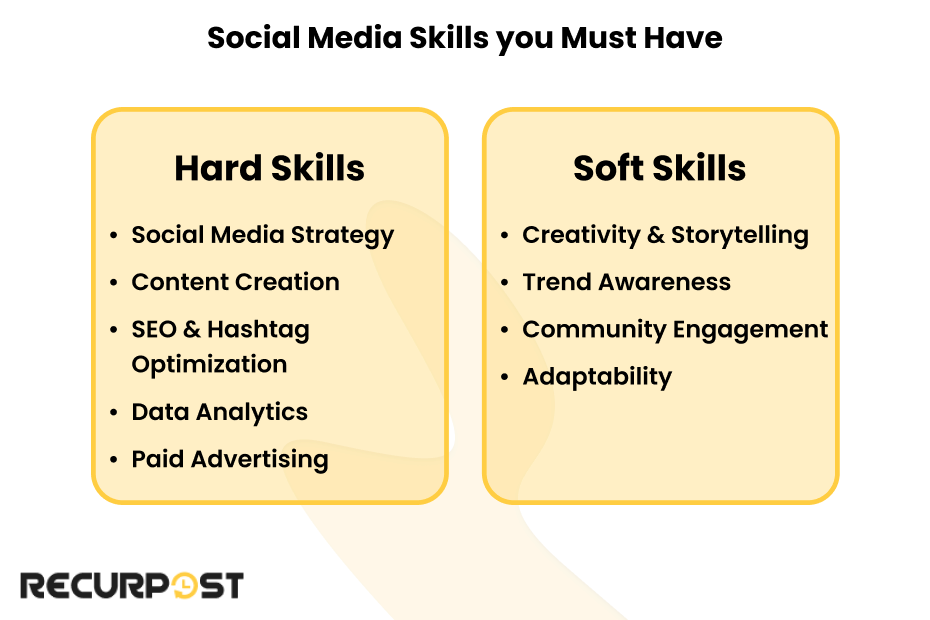
If you’re new to the industry, you can still create an impressive resume by leveraging personal projects, freelance work, and certifications. Let’s examine the social media manager skill set and how social media skills for resume can highlight your potential.
Key Social Media Skills for Your Resume (What Employers Want to See)
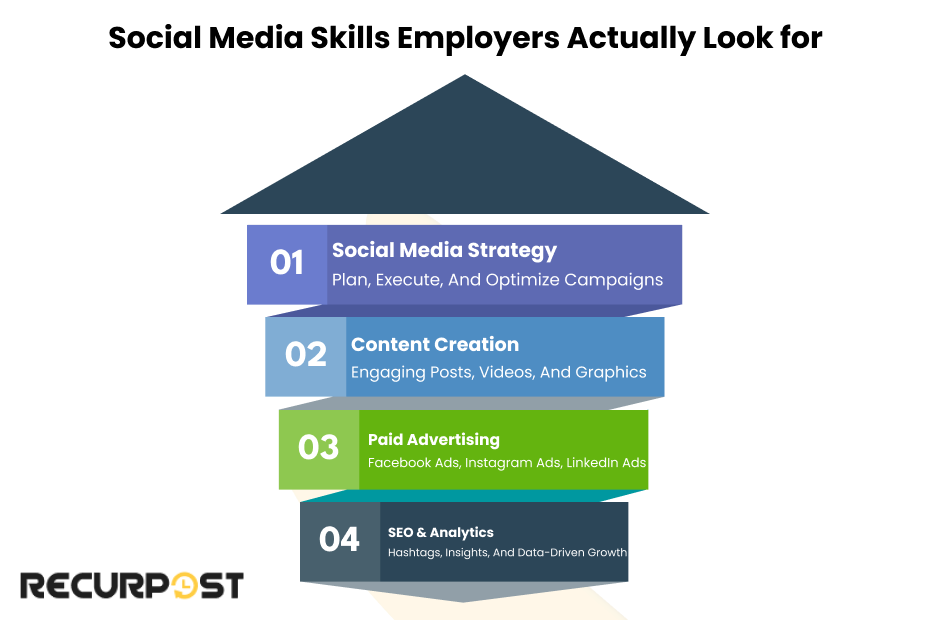
Your resume should showcase a balance of technical (hard) skills and soft skills that make you an effective digital marketer, particularly social media skills for resume that highlight your platform expertise.
A strong social media marketing resume shows how your social media skills for resume drive real results. Employers want to see technical expertise, platform mastery, and strategic thinking. These skills make your resume stand out whether you’re applying for Social Media Manager, Content Creator, or Digital Marketing roles.
Core Social Media Skills Employers Want to See: Social Media Skills Examples That Stand Out
Adding social media skills for resume to your resume isn’t enough; employers want proof you can grow brands, engage audiences, and drive business results. The best resumes highlight both technical skills and soft skills, showing platform expertise alongside a strategic understanding of trends and audience behavior. Showcase social media skills for resume that demonstrate measurable success and expertise across platforms.
Hard Skills: The Technical Expertise Employers Expect
These must-have social media marketing skills prove you can plan, create, analyze, and optimize campaigns. Social Media Managers, Marketing Specialists, and Content Creators need expertise in these areas:
| Skill | Why It’s Important | Example on Resume |
| Social Media Strategy | Long-term planning, audience growth, and campaign execution | “Designed social media marketing strategy that increased engagement by 120% in six months.” |
| Content Creation Skills | Writing, designing, and producing platform-specific content | “Produced 50+ social media posts monthly, leading to a 30% follower increase.” |
| Search Engine Optimization | Boosting visibility through keyword research and search optimization | “Boosted organic traffic by 60% by optimizing hashtags and captions.” |
| Analytical Skills & Reporting | Measuring performance using Google Analytics, Meta Insights, and RecurPost | “Used Meta Insights to refine campaigns, increasing conversion rates by 45%.” |
| Copywriting & Blogging | Writing compelling content for posts, blogs, and ads | “Crafted engaging blog posts and ad copy that increased conversion rates |
| Social Media Advertising | Running and optimizing Facebook Ads, Instagram Ads, LinkedIn Ads, TikTok Ads | “Optimized ad campaigns, reducing cost per conversion by 40% and increasing ROI 5X.” |
| Social Media Listening | Monitoring brand mentions and industry trends | “Monitored brand conversations with a social media listening tool to identify and solve 20+ customer service issues weekly.” |
| Community Management Skills | Engaging with followers, responding to comments, and managing brand reputation | “Increased Twitter engagement by 80% through proactive audience interactions.” |
| Video Marketing | Creating TikTok, YouTube Shorts, and Instagram Reels to maximize reach | “Produced viral short-form videos, generating 2M+ views and a 300% engagement boost.” |
| Crisis Management | Handling negative feedback, PR issues, and brand reputation risks | “Developed a real-time crisis response plan, reducing negative sentiment by 50%.” |
Employers look for real-world examples of these social media skills for resume in action, so always pair them with metrics that show measurable results.
Soft Skills: The Traits That Drive Engagement & Growth
While technical skills help execute a strategy, soft skills for resume determine how well you connect with audiences and adapt to changing trends. Here are the key traits hiring managers want to see:
| Skill | Why It’s Valuable |
| Communication & Customer Service | Crafting compelling narratives that engage and entertain audiences. |
| Time Management & Project Management | Effectively handling deadlines and managing multiple projects simultaneously. |
| Creativity & Storytelling | Crafting compelling narratives that engage and entertain audiences. |
| Trend Awareness | Staying ahead of algorithm changes and viral content trends. |
| Community Engagement | Building relationships with followers, influencers, and customers. |
| Adaptability & Flexibility | Adjusting quickly to changes in platforms, audience preferences, and marketing trends. |
| Brand Voice Development | Ensuring consistent messaging across all social media channels. |
For social media professionals, creativity and strategic thinking go hand in hand. Employers don’t just want someone who can use Instagram or Twitter; they want someone who understands how to turn content into engagement, engagement into leads, and leads into loyal customers.
Tip: Don’t just list skills, showcase how you’ve used them to drive measurable results. Highlight your communication skills in the way you write your resume, too!
How to Put Social Media Skills on a Resume
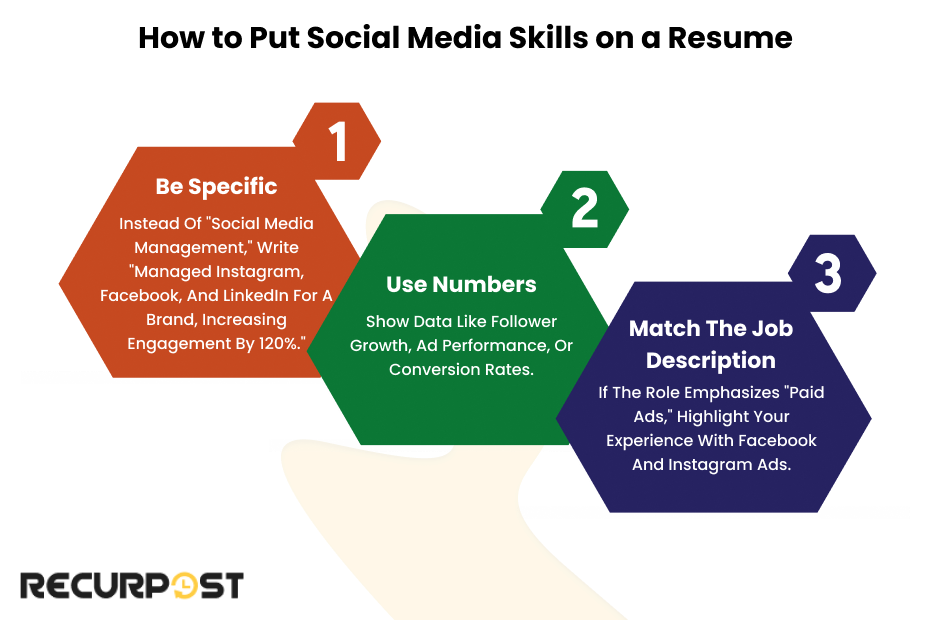
Many social media professionals undersell their contributions by writing generic job descriptions. To stand out, quantify your social media skills for resume and demonstrate real impact.
When it comes to listing social media experience on a resume, numbers make all the difference. Hiring managers don’t just want to see what you did; they want to see how well you did it. Instead of vague descriptions, use specific metrics to highlight your impact.
Here’s how to do it:
1. Show Growth and Engagement
Social media success measures include follower growth, engagement rates, and content reach. Instead of saying:
“Managed Instagram and Facebook accounts.”
Try this:
“Grew Instagram following from 10K to 50K in one year, increasing engagement rate from 3% to 7% through strategic content and community interaction.”
This shows clear, measurable results, something recruiters and employers love.
2. Highlight the Performance of Specific Campaigns
If you’ve worked on marketing campaigns, don’t just list them; showcase their success. Instead of:
“Ran a Facebook ad campaign.”
Say:
“Managed a $15,000 Facebook ad campaign that generated 5,000+ leads and lowered cost-per-click by 30%.”
This makes your experience data-driven and result-oriented, proving your ability to optimize performance.
3. Demonstrate Content Effectiveness
Content creation skills are a big part of social media marketing, but just saying you created posts won’t cut it. Show the results. Instead of:
“Posted social media content for a brand.”
Try:
“Created and scheduled 100+ social media posts per month, increasing post reach by 60% and driving 20% more website traffic.”
It’s all about proving that your work had a real business impact.
4. Showcase Audience Engagement and Community Growth
If you managed online communities, focus on how you increased engagement, responded to users, and built brand loyalty, showcasing your social media skills for resume. Instead of:
“Engaged with followers on Twitter.”
Try:
“Increased Twitter engagement by 80% through interactive polls, viral content strategies, and prompt customer service.”
This tells a recruiter exactly what you accomplished and how it benefited the brand, demonstrating your expertise in audience engagement and community growth.
5. Prove Your Impact on Sales and Conversions
When your social media work contributed to sales, lead generation, or website traffic, highlight those results. Instead of:
“Helped improve online sales through social media.”
Try:
“Developed a TikTok strategy that generated 10M+ views, leading to a 35% increase in product sales, showcasing your social media skills for resume.”
Recruiters want to see how your social media skills drive business growth. The more specific you can be, the stronger your resume will be.
6. Use Metrics That Matter
Not every role will have the same KPIs (Key Performance Indicators), so pick the numbers that best showcase your social media skills for resume. Here’s a quick guide:
| Metric | What It Shows | Example |
| Follower Growth | Ability to expand brand reach | “Grew Instagram followers by 200% in 6 months” |
| Engagement Rate | Content effectiveness & audience interest | “Boosted LinkedIn engagement rate from 2% to 6%” |
| Website Traffic | Driving users from social to site | “Increased referral traffic from Facebook by 40%” |
| Lead Generation | Ability to convert followers to customers | “Generated 5,000 leads through Instagram ads” |
| Sales/Conversions | Impact on revenue & business growth | “Drove $50K in sales from a viral TikTok campaign” |
7. Add Experience Even When You’re Just Starting
| Strategy | How to Implement |
| Leverage Personal Projects | “Grew a personal TikTok account to 50K followers using viral trends.” |
| Freelance or Volunteer | “Managed social media for a nonprofit, increasing their reach by 200%.” |
| Certifications & Courses | “Completed HubSpot Social Media Certification and Facebook Blueprint.” |
Tip: Even if you haven’t had a formal job, show results from your projects. Employers want proof that you can deliver.
8. Must Add Proper Details When You’re Experienced
| Achievement | Example Resume Bullet Points |
| Audience Growth | “Increased Instagram following from 10K to 100K in one year through influencer collaborations.” |
| Engagement Boost | “Improved engagement rate by 60% through interactive polls and real-time responses.” |
| Revenue Impact | “Managed $100K in paid advertising, increasing e-commerce sales by 200%.” |
Social Media Manager Job Description for Resume
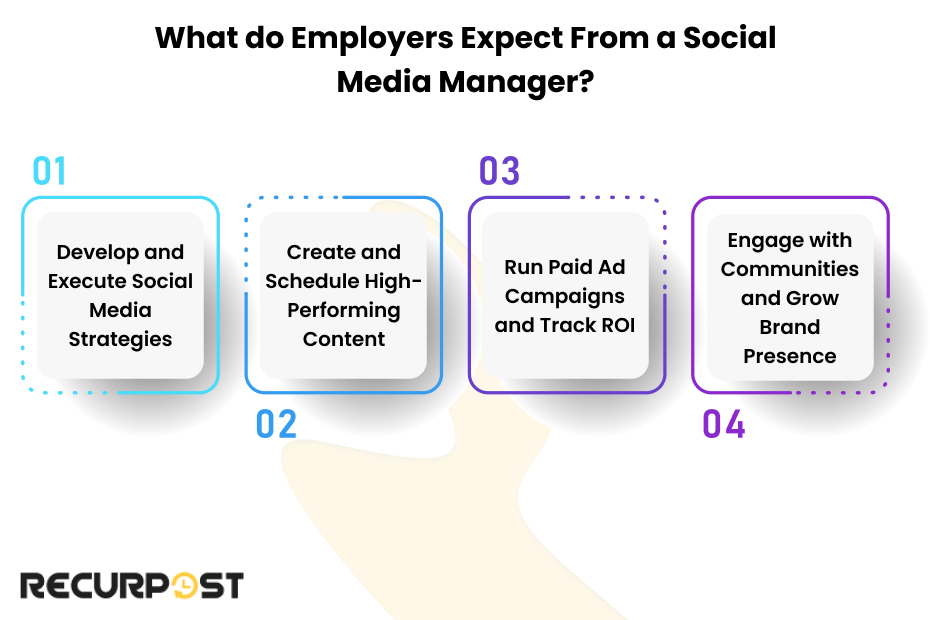
If applying for a Social Media Manager or Social Media Specialist role, customize your social media skills for resume based on industry best practices. The goal is to grow the
1. Developing and Implementing Social Media Strategies
Every brand needs a plan. Social Media Manager skills for resume include creating and executing strategies that align with business goals, whether that’s building brand awareness, increasing engagement, or driving sales. It’s all about knowing the audience, understanding trends, and creating content that actually connects.
2. Creating, Scheduling, and Managing Content Across Platforms
Social media isn’t just one platform; it’s a whole ecosystem. From Instagram and Facebook to LinkedIn, Twitter, and TikTok, each platform has a different audience and a different style. Social Media Managers:
- Plan content calendars and schedule with RecurPost to keep things consistent
- Write engaging captions that make people stop and interact, showcasing social media skills for resume
- Design graphics, edit videos, and create content that fits each platform
- Stay on top of trends so posts don’t feel outdated, demonstrating expertise in social media content creation
3. Optimizing Search Engine Optimization and Hashtags for Better Reach
Great content is useless if no one sees it. That’s why SEO and hashtags matter. Social Media Managers use keyword research, trending hashtags, and optimized descriptions to make sure posts reach the right people, showcasing their social media skills for resume. It’s not just about what to post but also about how to make it discoverable.
4. Analyzing Performance and Adjusting Strategies
Social media isn’t guesswork; it’s data-driven. Using tools like Google Analytics, Meta Insights, and RecurPost, Social Media Managers track:
- What’s working (and what’s not)
- Engagement rates, follower growth, and conversions, showcasing social media skills for resume
- How to tweak content, posting times, or ad budgets to get better results
5. Running Paid Advertising Campaigns
Organic reach is great, but paid ads take it further. A Social Media Manager sets up and manages campaigns across platforms like Facebook Ads, Instagram, LinkedIn, and TikTok to:
- Target the right audience and maximize reach, showcasing social media skills for resume
- Optimize budgets for the best ROI
- Test different creatives to see what works best, demonstrating your expertise in paid advertising strategies
6. Engaging with the Community and Building Brand Reputation
Social media isn’t just about broadcasting; it’s about conversations. A Social Media Manager:
- Responds to comments, messages, and customer inquiries, showcasing social media skills for resume
- Engages with followers to build a loyal community
- Handles complaints and manages brand reputation
Social media is more than just posting; it’s about strategy, creativity, and constant learning. A good Social Media Manager knows how to keep up with trends, analyze data, and create content that actually matters to people, demonstrating expertise in community engagement and brand reputation management.
How to Optimize for ATS (Applicant Tracking Systems)

Companies rely on Applicant Tracking Systems (ATS) to scan resumes before human review. Resumes without proper formatting or industry-specific keywords face automatic rejection regardless of qualifications.
To improve your chances of passing ATS screening, follow these best practices for formatting your social media skills for resume.
ATS Best Practices for a Social Media Resume
A well-optimized resume combines content and structure. ATS software reads and ranks resumes based on relevant skills, experience, and keywords. Ensure your resume passes ATS screening by:
1. Use Keywords from the Social Media Job Description Naturally
Recruiters search for candidates using specific keywords in ATS databases. Identify relevant terms from job postings and integrate them naturally throughout your social media skills for resume:
- Instead of “Managed company’s social media,” say “Developed and executed a social media marketing strategy that increased engagement by 45%.”
- If a job mentions Facebook Ads, SEO, or Google Analytics, include these exact terms (as long as you have experience with them).
- Focus on skills like content creation, social media analytics, influencer marketing, paid social campaigns, and audience growth to match employer expectations.
2. Keep Formatting Simple and ATS-Friendly
ATS software often struggles with complex layouts and non-traditional formatting. To avoid errors, keep your resume structure clean and professional, showcasing your social media skills for resume in a clear, accessible format:
- Use a single-column format; tables, columns, and graphics may not be read correctly.
- Choose a standard font like Arial, Calibri, or Times New Roman (avoid decorative fonts).
- Stick to black text on a white background; some ATS systems misinterpret colors.
- Avoid including images, logos, or icons; they don’t get scanned properly.
3. Use Standard Section Headings
ATS systems rely on specific section titles to categorize your information. Always use clear, universally recognized headings like:
- Work Experience
- Skills
- Education
- Certifications
- Projects (if applicable)
Under the Skills section, you can include skills such as:
- Content Creation Abilities
- Analytics Interpretation Skills
- Paid Advertising Knowledge
- Brand Management Skills
- Engagement Optimization Skills
- Social Media Marketing
Avoid creative or vague headings like “My Career Journey” or “Expertise & Strengths,” as these may not be recognised by the software.
4. Save Your Resume in the Right File Format
Some ATS platforms struggle to read certain file types. To ensure your resume is correctly parsed and your social media skills for resume are highlighted, save your resume as a Word document (.docx) or a PDF; these formats are the most widely accepted.
Avoid sending Google Docs or Pages files, as they may not be processed correctly when uploaded to a hiring system.
ATS-Friendly Resume Checklist
Before submitting your resume, use this checklist to make sure it’s optimized for ATS and showcases your social media skills for resume:
- Use industry-relevant resume keywords naturally in your social media job descriptions and skills section
- Keep formatting simple, avoid tables, columns, or images in the main resume body
- Use standard section headings like “Work Experience,” “Skills,” and “Certifications”
- Save your resume as a .docx or PDF for maximum compatibility
Avoid These Common Social Media Job Resume Mistakes

A well-crafted resume can open doors to exciting opportunities in social media marketing, but even experienced professionals often make critical mistakes that cause their resumes to be overlooked. If you’re struggling to land interviews, it may be time to refine your approach and ensure your social media skills for resume are showcased effectively.
Here are some of the most common mistakes that could be holding you back and how to fix them.
1. Being Too Vague About Your Social Media Skills
Many job seekers make the mistake of listing broad responsibilities without showcasing their real impact. A generic statement like:
“Managed social media accounts for a brand”
… doesn’t tell a hiring manager what you actually accomplished. Instead, be specific and results-oriented:
“Developed and scheduled 50+ posts per month across Instagram, Facebook, and LinkedIn, increasing engagement by 45% within six months, showcasing your social media skills for resume.”
By providing clear numbers and details, you demonstrate the effectiveness of your work rather than simply stating a job duty.
2. Not Using Data to Showcase Results
Numbers matter. Employers want to see measurable outcomes that prove your ability to drive engagement, grow an audience, and contribute to business goals. Compare these two descriptions:
“Increased brand awareness on social media.”
“Boosted Instagram follower count by 150% in six months through influencer partnerships and data-driven content strategy, showcasing social media skills for resume.”
A data-backed resume not only sets you apart from other candidates but also provides tangible proof of your success in social media marketing and demonstrates your social media skills for resume. Using specific metrics like these proves your ability to leverage social media skills to drive real results for the brand.
3. Ignoring Important Keywords and ATS Optimization
Applicant Tracking Systems (ATS) scan and filter resumes before they ever reach a recruiter. If your resume doesn’t include relevant keywords like social media skills for resume, it may never make it past the initial screening.
For example, if a job description includes skills like:
- Facebook Ads
- Search Engine Optimization
- Social media analytics
- Paid media strategy
…but your resume doesn’t mention any of these, you’re likely to be overlooked. Always scan the job posting for relevant keywords like social media skills for resume and naturally incorporate them into your resume.
By ensuring your social media skills for resume are clearly stated and aligned with the job description, you’ll increase your chances of passing ATS and standing out to hiring managers.
4. Failing to Tailor Your Resume for Each Job
A one-size-fits-all resume is a major red flag for recruiters. Every social media role is different, and hiring managers want to see that your experience matches their specific needs.
Instead of submitting the same resume for every job, tweak it to highlight the most relevant social media skills, platforms, and strategies based on the position. For example:
- If applying for a Social Media Manager role, emphasize strategy, analytics, and campaign execution.
- If targeting a Content Creator position, focus on graphic design, video editing, and audience engagement.
- If seeking a Paid Media Specialist job, highlight Facebook Ads, PPC campaigns, and ROI-driven marketing.
Tailoring your resume increases your chances of catching a recruiter’s attention and securing an interview.
5. Overloading Your Resume with Buzzwords Instead of Actionable Skills
While it’s essential to use industry-relevant keywords, stuffing your resume with vague buzzwords won’t help. Saying you are “a social media guru with a passion for engagement” is meaningless unless you can back it up with experience and data.
Instead, focus on actionable social media skills for resume and proven achievements that demonstrate your expertise:
- “Executed a TikTok marketing strategy that increased video views by 300% in three months, showcasing social media skills.”
- “Optimized LinkedIn content for B2B outreach, generating 50+ qualified leads per quarter, demonstrating expertise in content strategy.”
- “Managed a $20,000 paid ad budget across Facebook and Instagram, reducing cost-per-click by 35%, showcasing your paid advertising knowledge.”
6. Neglecting Certifications and Professional Development
If you have relevant certifications in social media marketing, don’t leave them off your resume. Courses from Google Analytics, Meta Blueprint, HubSpot, or RecurPost add credibility and show that you stay updated with industry trends, highlighting your social media skills for resume.
Even if you don’t have formal experience, certifications can demonstrate your expertise in areas like:
- Social media analytics
- Content marketing
- SEO and digital advertising
- Community management
Hiring managers value candidates who are proactive about learning and professional growth, especially those with social media skills for resume that align with the job requirements.
Final Thoughts
Social media is a results-driven industry, and recruiters want to see proof that you can grow audiences, boost engagement, and drive conversions. Highlighting your social media skills for resume is key to making your experience stand out.
Tailor your resume for each job by aligning your social media skills with the social media job description.
Use real numbers to show measurable results, such as follower growth, engagement rates, and ad performance — all of which showcase your social media skills for resume.
Keep it clear, structured, and easy to skim, as recruiters typically scan resumes in seconds. The clearer your social media skills are, the better chance you have to make an impact.
Don’t forget to create an online portfolio to complement your resume and showcase your work. This is a great way to provide a visual and tangible example of your social media skills and you can link to it on your LinkedIn profile.
Now, update your resume, highlight your experience with a social media marketing team, add these key skills, and start getting the interviews you deserve.
TL;DR
- Simply listing social media platforms isn’t enough; showcase measurable results with numbers and impact-driven statements.
- Use a clear resume format (chronological for experienced professionals, functional for beginners, hybrid for a balance). You can also look into a resume builder to help you get started.
- A strong summary should highlight key achievements, like increased engagement, audience growth, or ROI from campaigns. Avoid a generic resume objective and focus on a powerful summary instead.
- Include hard skills (content creation, analytics, paid ads) and soft skills (creativity, trend awareness, adaptability).
- Use metrics to showcase impact, e.g., “Boosted Instagram followers by 200% in 8 months.”
- Certifications (Google Analytics, Meta Blueprint, HubSpot) add credibility and demonstrate expertise.
- Tailor your resume for specific roles, focus on social media marketing and leadership for senior positions, content creation skills, and engagement for entry-level roles.
- If you don’t have formal experience, showcase personal projects, freelance work, or volunteer social media account management.
- Optimize your resume for ATS (Applicant Tracking Systems) by using keywords naturally and keeping formatting simple.
- Avoid common mistakes like vague descriptions, missing numbers, or not updating your resume regularly.
- A well-crafted resume should not just list digital marketing skills but also prove your ability to drive social media success.
- Use strong action verbs for resume bullet points to highlight your accomplishments.
- For more candid advice, check out forums like social media skills for a resume on Reddit.
FAQs on Listing Social Media Skills for Resume
1. How do I effectively list social media skills on my resume?
To showcase your social media skills for resume, highlight your experience with social media platforms, content creation skills that increased user engagement, and campaign performance. Instead of simply listing “social media management,” provide specific examples like “Developed a social media marketing strategy that increased audience engagement by 60% in six months.” This not only demonstrates your social media skills for resume but also gives recruiters clear, measurable proof of your impact.
2. What are the most important social media skills hiring managers look for?
Hiring managers seek candidates with social media technical skills for resume (like Google Analytics, social media analytics, and social media marketing tools) and soft skills for resume (like community management and data-driven decision-making). They prioritize professionals who can create engaging content, analyze key metrics, and develop a strong customer retention strategy. Highlight your social media skills for resume in both technical and interpersonal areas to stand out.
3. How can I highlight social media campaigns I’ve worked on?
To showcase social media marketing campaigns, mention the social media platforms you worked on, the goals, and the key performance indicators (KPIs) you achieved. For example, “Led an Instagram ad campaign that boosted website traffic by 45% and increased conversions by 30%.” Quantifying your results demonstrates social media skills for resume and highlights your ability to achieve business goals through social media.
4. Should I include social media certification on my resume?
Yes! Certifications like Google Analytics, RecurPost, Sprout Social, or a social media certification from HubSpot add credibility. They demonstrate expertise in social media management, data analysis, and digital marketing, helping you stand out to potential employers. Include relevant social media skills for resume to show your commitment to professional growth.
5. How can social media marketing managers tailor their resumes for different roles?
A social media marketing resume should align with the specific job description for each role. If applying for a media strategist role, highlight social media marketing strategy, social media metrics, and data-driven decision-making. If targeting a marketing coordinator role, focus on social media tasks, community management, and content creation. By tailoring your resume to each job, you can demonstrate the relevant social media skills for resume that match the employer’s needs.
6. What’s the best way to show a proven track record in social media marketing?
Use quantifiable data to highlight your proven track record in social media marketing. Employers value resumes that mention audience insights, campaign performance, and key metrics like “Increased brand visibility by 80% through targeted social media posts and networking skills.” This shows your social media skills for resume and your ability to generate results that align with business goals.
7. How can I stand out as a senior social media manager or a digital marketing manager?
A senior social media manager or digital marketing manager should showcase leadership experience in social media marketing strategy, digital marketing skills, and project management. You should also highlight your ability to manage a social media marketing team, train new employees, and report results to senior leadership. Show how your social media skills for resume extend into leadership and strategy.
8. Can I add personal brand experience to my resume?
Yes! Managing professional social media accounts or a personal brand shows real-world expertise and positions you as a social media specialist. Suppose you’ve grown your own social channels or built a following. In that case, it demonstrates practical knowledge in content creation, industry insights, and social media presence, which are valuable creative skills for social media jobs in the creative industry.
9. What is the hourly rate for a social media consultant?
The social media consultant’s hourly rate varies based on experience, industry, and location. On average, consultants charge between $50 and $150 per hour, with top experts commanding even higher rates for specialized services. Show your social media skills for resume through consulting experience if applicable.
10. How much does a social media marketer earn?
The social media marketing salary depends on the job title and level of expertise. Entry-level social media marketers can earn around $40,000 per year, while experienced professionals and managers may earn upwards of $80,000 annually. Emphasize your social media skills for resume and achievements to increase your earning potential.
11. What is the typical pay structure for social media marketing roles?
The social media marketing pay can be structured as hourly, project-based, or full-time salaries. Freelancers and consultants often work on a per-hour or per-project basis, while in-house social media managers typically receive a fixed salary with potential bonuses. Tailor your social media skills for resume to the type of role and compensation you’re seeking.

Ayushi Jain is a content writer with expertise in creating engaging, SEO-friendly content across various industries. With a focus on storytelling and clarity, she helps brands connect with their audience effectively.

